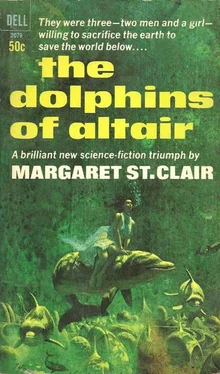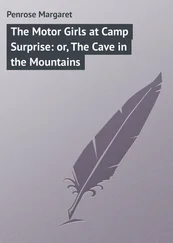“I’m not sure. About a couple of hours.”
Now that we had a definite goal, we swam faster. We got to the rock—a tiny thing, only a few yards across—by mid-morning.
I was astonished at how deeply the rock was submerged. The triangular vertical face, streaked with bird droppings, which had always been a good twenty feet above sea level, was almost under the water. It occurred to me that if the water rose much more our Split friends might be drowned while they slept. But Sven was right, they must rest. It had to be risked.
Ivry and Pettrus swam beside each other, and Sven managed to undo the knots at Sosa’s ankles. The leather had swelled from the water, and it took him some time. Then he released his own feet.
Pettrus swam in close to the rock with him. Sven, as he said afterwards, was paralyzed from the waist down, but he caught a protrusion with his fingers and dragged himself up on a small horizontal shelf.
He sat there for some minutes, rubbing his legs and trying to get command of his body again, while Sosa waited below on Ivry’s back, he r head sunk on her breast. At last he was strong enough to put his hand out to the girl and pull her up beside him on the narrow shelf.
They both rested here a while. Then they turned and crawled painfully up to the top of the rock. Their legs were still quite unreliable, and we dolphins watched their progress anxiously.
At last they reached the crest. Here, Sven said, they found a little sea grass growing in a hollow at the very peak. They lay down on the coarse stuff, clasped in each other’s arms for warmth, and were immediately asleep.
They slept for nearly twenty hours. During the rest of the day, the water rose slightly, and we watched its movement up the triangular rock face nervously. We were afraid we would have to call our Split friends and have them get on our backs again. But about sunset the level began to fall slightly, and by the next morning the water was four or five feet below the triangular face.
While Sven and Moonlight slept, we dozed, caught fish and talked to each other. We felt we were beginning to make some bodily adjustments to our lessened buoyancy, though it was still irksome to us, and would be so for a long time. Once we smelled a shark, but it was a long way off and seemed to be in distress. It did not bother us.
Toward dawn the skies cleared and the rain died away. By the time our friends woke up, it was a reasonably good day, with the sun visible from time to time.
“I’ve been thinking,” Sven said after we had exchanged greetings with our friends. “The water’s fallen a good deal.
That means that the flood from the North Polar ice melt has begun to equalize itself, and the South Polar flood hasn’t yet begun.”
“Or hasn’t got here yet,” I said.
“Yes. Well, when it does come, this rock is probably going to be submerged. Maddy and I can’t ride out another flood, a longer-lasting flood than the one we just went through, on your backs at sea. Amtor, is there any place where you dolphins could put us down on the mainland? Some place with mountains behind it? If we have time, we can try to get to high ground.”
I blew water. “I don’t know. I mean, I know about how far we are from where the coast used to be, but I can’t possibly tell what it’s like now. There will be a lot of new currents, for one thing. But we can try it. There’s not much else we can do.”
“Where are we now?” Madelaine asked.
“We’re opposite a place about a hundred miles below that big river that doesn’t have any bay.”
“The Klamath River?”
“I guess so. We don’t always know the names you Splits have for things.”
“Never mind that,” Sven said. “Let’s get going. If he means the Klamath River, there’s high ground not too far from it. We’ve eaten all our food.”
He began helping Moonlight down toward the water. They both moved stiffly and awkwardly. Rain and salt spray had washed most of the dye from the girl’s hair. I was glad to see it its usual color again.
With a good deal of difficulty, the Splits got on Pettrus’ and Ivry’s backs. “Northeast, I think,” Sven said. “The farther we can get from the South Polar flood, the better. And east, of course, because we want to get back to the American coast.”
“All right,” Ivry said.
As the day grew brighter, all our spirits rose. The sea was smooth, and we made very good time, particularly since there was a current flowing east. It hadn’t been there before.
Late in the afternoon, Djuna and I went fishing. We fed Ivry and Pettrus, and then, since we knew the two Splits hadn’t had anything to eat, offered part of our catch to them.
“It’s not alive, you know,” I said as Djuna held the salmon out to Sven in her mouth. “She bit it in the head.”
“I—thank you. Madelaine, are you hungry enough to try raw fish?”
“Not yet. But put it in your jacket, Sven, and keep it. We may be short of food after we get ashore.”
At sunset, the Splits tied their legs together under the two dolphins’ bellies. The sea continued calm. The moon rose. It was hardly well up in the sky when we saw land ahead.
It was very different from how I had remembered it— Buildings rose straight out of the surface of the water, and the mass of land lay far behind them. There were no lights anywhere.
“Be careful,” Madelaine said as we swam in slowly. “We don’t know how deep the water is, or what’s under it.”
“Of course,” I answered. “Djuna and I will go ahead and act as pilots, since we can dive to see if there’s danger.”
Cautiously we swam in beside the drowned city. The water was quite deep, thirty or forty feet, and it occurred to me that we were following the streets of the submerged city. There were many bodies of Splits floating among the buildings. We avoided them as much as we could. The moonlight robbed them of color and made them look unreal.
Madelaine stirred uneasily on Pettrus’ back. “I wonder what city this was,” she said. I noticed how softly she and Sven were speaking. “Amtor, are we near the river you spoke of?”
“We’re somewhat north of it.”
“Then this is probably Crescent City,” Sven replied.
Neither of them said anything more as we left the city behind and approached a range of low hills. The water grew shallower. I dived and found land, still covered with grass, only two or three feet below me.
“We’ll have to let you off here,” I said.
“Yes.” Sven undid the straps from his ankles, and slid into the water. He help ed Madelaine untie herself. Then they both waded toward the hills.
“Good-bye,” Madelaine said. She turned toward us, holding out her hands. “When the waters start to go down,” she said quickly, “call us to you. Use Udra. We’ll come. We will meet again, my darlings! I know it. I am sure of it.”
“So are we, Sosa,” I answered. This was true. And yet, our good-byes made, we were all heavy-hearted as we started back to deeper water. It was the first time since Sosa had come to us at Drake’s Bay, months before, that we had been parted from her.
The old man held up the lamp and peered at them doubtfully. The scattering of white hairs on his scalp glistened in the light. “You’re refugees?” he asked.
“Yes,” Sven answered. “All we want is to get in out of the rain for a while and a place to cook. Here.” He produced the salmon Djuna had caught—it was still fresh enough to be desirable—and showed it to the old man. “We’d be glad to share with you. I can’t get a fire started outside. Everything’s so wet.”
The old man did not move away from the door. “I don’t need your food,” he said. “I’ve got a whole freezer full of stuff that’s spoiling since the power went off. I’m sorry, but I can’t take you in. You’ll have to be on your way.”
Читать дальше












